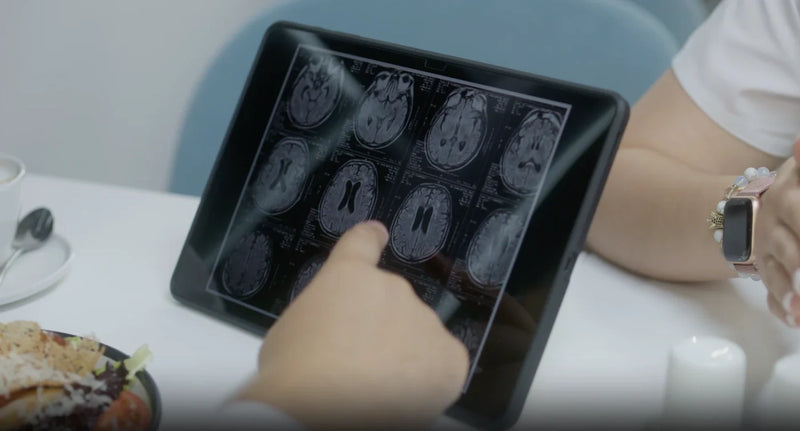
How Oral Health May Influence Migraines and Chronic Headaches
Essential Takeaways
- Emerging research suggests oral health may influence headache patterns through inflammatory pathways. Maintaining superior oral hygiene could be one component of headache prevention.
If you've been battling chronic headaches or migraines, you've probably explored countless triggers - stress, food sensitivities, hormones, sleep patterns. But there's one potential culprit that rarely makes the list: your oral health.
The connection between your mouth and your head pain isn't just theory. It's grounded in emerging science that's reshaping how we think about migraine prevention and treatment.
The Oral-Brain Connection: What We Know So Far
Your mouth and brain are more connected than you might think. The trigeminal nerve - your body's largest cranial nerve has branches that extend throughout your oral cavity and connect directly to pain centers in your brain. When inflammation occurs in your mouth, it can potentially influence neurological pathways associated with headache disorders.
"Given the anatomical proximity of the trigeminovascular system to the oral cavity, significant changes in oral conditions, including local inflammation and oral dysbiosis, may directly or indirectly influence the development of migraine." - You can review the study for more detail here.
Research shows that people with gum disease often have elevated levels of inflammatory markers like IL-6 and TNF-α, which are also found in higher concentrations in migraine sufferers. While this doesn't prove causation, it suggests shared inflammatory pathways that researchers are actively investigating.
What Current Research Reveals
Recent studies have begun exploring the oral health-headache connection:
- Gum disease and migraines: A 2020 case-control study found that periodontitis was more prevalent among migraine patients compared to healthy controls, with some correlation to migraine frequency
- Inflammatory markers: Both gum disease and migraines are associated with elevated systemic inflammation
- TMJ disorders: Well-established research confirms that temporomandibular joint dysfunction affects millions of Americans and is strongly linked to tension headaches and facial pain
- Sleep disruption: Oral pain and inflammation can disrupt sleep quality, and poor sleep is a recognized migraine trigger
Four Potential Pathways Connecting Oral Health to Headaches
1. Inflammatory Response
When gum disease is present, your body produces inflammatory proteins (cytokines) that circulate throughout your system. These same inflammatory markers are elevated during migraine episodes, suggesting a possible shared pathway.
2. TMJ Dysfunction
Problems with jaw alignment, teeth grinding, or jaw muscle tension can create temporomandibular joint dysfunction. This is a well-documented cause of tension headaches and facial pain.
3. Bacterial Activity
Harmful oral bacteria like Porphyromonas gingivalis produce endotoxins that may contribute to systemic inflammation. Some research suggests these bacteria might even reach the brain, though the mechanisms are still being studied.
4. Sleep Quality
Oral discomfort, teeth grinding, or sleep apnea related to oral health issues can disrupt restorative sleep. A key factor in migraine prevention.

The Role of Better Oral Care
Maintaining optimal oral health makes sense for overall health. This is where advanced oral care technology can play a valuable role.
How the Feno System May Help:
Comprehensive Cleaning: The Feno Smartbrush's 18,000 bristles and 20-second full-mouth design aims to remove plaque more thoroughly than traditional brushing methods, potentially reducing inflammatory triggers.
Monitoring Capabilities: Built-in scanning technology helps track oral health changes over time, allowing for early intervention when inflammation begins.
Consistent Care: The simplified 20-second routine makes it easier to maintain daily oral hygiene, addressing one barrier to consistent preventive care.
A Practical Approach to Prevention
While research continues to explore the oral health-migraine connection, focusing on excellent oral hygiene is beneficial regardless. Patients who maintain superior oral health often report improvements in their overall sense of well-being.
The key is consistency. Something that traditional brushing methods make challenging for busy lives. When oral care becomes effortless, people are more likely to maintain the routine that supports both oral and potentially systemic health.
The Bottom Line
The connection between oral health and migraines is an emerging area of research that shows promise but requires more study. What we do know is that maintaining excellent oral health supports overall wellness and may help reduce some potential headache triggers.
If you suffer from chronic headaches or migraines, it's worth discussing your oral health with both your dentist and physician. While better oral care isn't a cure for migraines, it's one piece of a comprehensive approach to health that may contribute to your overall well-being.

Feno Founders Edition Bundle
Advanced Oral Health in 20 Seconds with the Feno Smartbrush™
Get Yours Now!



